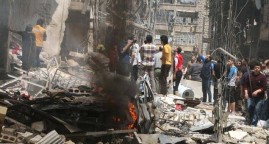Syria : laboratory of a new regional order in the Middle East
The role of Russia and the credibility of the US commitment in Syria dominated the discussions of the Munich Security Conference
What world order will emerge from the conflict in the Levant? How the European Union will survive face to the challenges of migration crisis and the conflict in Ukraine, including those of the continuing fragility of the eurozone and the threat of “Brexit”? These issues dominated the discussions during the three days of the 52nd Conference on Security in Munich.
“Syria is the laboratory of a new regional order in the Middle East”, summarizes January Techau, director of Carnegie Europe.
The fragile agreement on a “cessation of hostilities” adopted Friday, February 12 in Munich by the 17 countries of the International Support Group for Syria (GISS) shows that although the confit becomes costly for all stakeholders, not all still seem prepared for a real compromise.
In a heavy atmosphere, the question of the role of Russia dominated trade. Medvedev accused NATO of being “still as opaque and unfriendly” by asking his secretary general if we were “in 2016′ or 1962′”. “We slipped, he said, in a period of new Cold War.”
Russian leaders attribute the responsibility for terrorism, migration crisis, the crisis in Ukraine and the Arab Spring to the “failed efforts to impose Western democracy”. To those who ask Moscow to end its bombing on the civilian population and the opposition “moderate” in Syria, the Russian Prime Minister replied that there exists “no evidence”.
Read the full article (in french) on La Croix website
Related Articles
Jean-Philippe Gaudin: “Forced migration has always been a weapon”
02/17/2016. Jean-Philippe Gaudin back on the Daesch’ willingness to destabilize Europe and the response that states must provide.
Diplomatie humanitaire et action humanitaire
02/10/2014. Peter Maurer, Président du CICR s’exprime (en anglais) sur la diplomatie humanitaire.
Syria: Russians and Americans continue to collaborate
04/23/2016. Meetings are held on the sidelines of the official talks.






